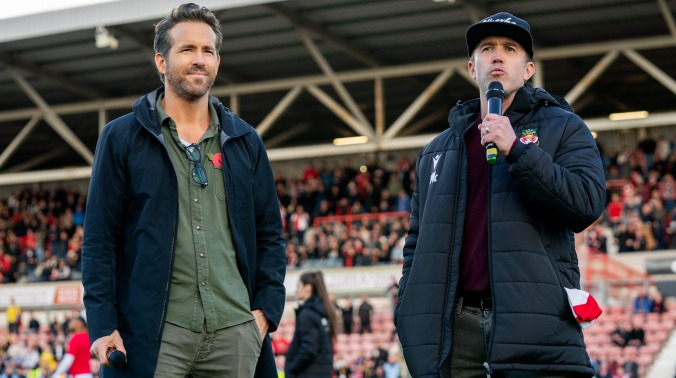Rob McElhenney and Ryan Reynolds buy a football club in Welcome To Wrexham
Hollywood descends upon a working-class Welsh town in this FX docuseries

In November 2020, It’s Always Sunny In Philadelphia creator and star Rob McElhenney formed a company with Ryan Reynolds and bought a small professional football club in the U.K. (We’ll give those of you who hadn’t heard about it time to Google it and confirm this is a real thing. And yes, also, we’ll be calling it football for the duration of this review.)
Despite obvious (and dull) comparisons to Ted Lasso from many corners, once the docuseries Welcome To Wrexham wraps its second episode, it’s clear this isn’t the real-life equivalent of the hyper-optimistic Apple TV+ hit. Not because it’s dour, but because, from top to bottom, there’s a sense of competency and jeopardy amongst the people behind this lovably wacky narrative.
And it is wacky. Welcome To Wrexham addresses the elephant in the room early on: Why these two guys? Why this club? Why … any of this? A single, concrete answer remains elusive, but the pair are clearly having a good time. There are reports McElhenney got the seed of the idea after watching the modest Netflix success Sunderland ’Til I Die. “I wanted to do this but I needed more than just TV money to do it” McElhenney says in an early talking-head segment about why he approached Reynolds. “I needed someone with movie money. Superhero movie money. Gin baron money … How many more companies does this bitch have?” The how and why of the two settling on Wrexham is vague, but it makes sense: While Wrexham is nowhere near the lofty heights of the Premier League and regularly televised matches, it’s a proud club and mainstay in U.K. football. In fact, it’s the third-oldest professional football team in the world.
McElhenney and Reynolds are obviously the stars of the show, and their patter is fun, but a core strength of the series is how it highlights the club, its supporters, and the town around them. On the day the supporters’ trust (Wrexham’s previous ownership, made up of more than a thousand working-class fans) convenes to discuss the proposed takeover, families around Wrexham gather around their laptops like they’re watching the moon landing for the opportunity to grill Deadpool about why they should entrust him with one of the most important parts of their daily lives. Wrexham is a long way from Hollywood, where Rob and Ryan sit in a marble-adorned kitchen agonizing over the expense of installing a new playing field, then paying for another when the first proves flawed after Wrexham’s opening match. One location in regular rotation is the pub outside the stadium; another is a shop advertising “DVDs, Blu-ray, and VHS.”
And there’s one more main character who emerges: Humphrey Ker, a brilliant British comedian who guest starred on Sunny and writes for McElhenney’s Mythic Quest. It seems Ker is the go-to source of football knowledge, advising McElhenney and Reynolds on everything from the realities of supporting a club (it’s mostly painful) to whether or not they should splash out to lure a successful striker from the league above to drop down a peg and join the project. Ker, eventually, is installed as the Executive Director at Wrexham (while retaining his TV career in the U.S.), and the awkward speech he gives to the players and coaching staff on his first visit to the club will resonate with anyone who’s ever felt a little out of their depth at work.
Welcome To Wrexham may, under cynical scrutiny, be viewed as a savvy PR move to lessen the risks McElhenney and Reynolds, who are credited as executive producers on this doc, have taken: If it all fails and we’ve got a bunch of footage of them caring, working, and furrowing their brows, then blowback is bound to be less intense if they cut their losses and pulled out. They’re aware of this, and both seem genuinely concerned with being perceived as dilettantes or, as they frequently put it, “assholes.” “We can’t just disappear if this fails,” Reynolds thinks out loud at one point in a Zoom call with his partner. “People … well, they know how to find us.”
There is plenty of opportunity for failure, and the docuseries definitely doesn’t shy away from some of the harsh realities of football ownership: Older or underperforming players have to be released; coaches have to be sacked; and in courting professionals to run and manage their club, McElhenney and Reynolds constantly have to prove that they’re for real. The overall vibe, though, is fun, with the show doing an excellent job explaining the frustratingly complex English league system with zippy diagrams and pithy U.S.-to-U.K.-to-Welsh translations here and there. And when the turnstiles open for Wrexham’s first official match under the new ownership, the atmosphere in the 10,000 capacity stadium is powerful and raw (and a far cry from Ted Lasso’s painfully unconvincing CGI crowds and depiction of The Beautiful Game). To love football, one must enter an agreement to take the agony with the ecstasy, and Wrexham’s had enough agony. It’s time for a bit of fun.